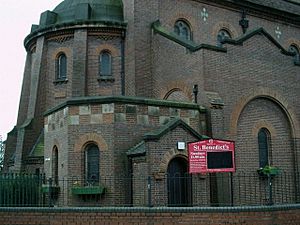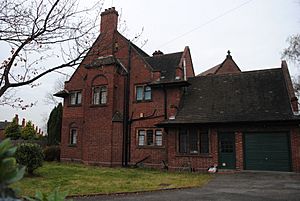St Benedict's Church, Bordesley facts for kids
Quick facts for kids St Benedict's Church, Bordesley |
|
|---|---|

The east end of St Benedict's Church, which has a rounded shape called an apse.
|
|
| Lua error in Module:Location_map at line 420: attempt to index field 'wikibase' (a nil value). | |
| Location | Birmingham |
| Country | England |
| Denomination | Church of England |
| History | |
| Dedication | St Benedict of Nursia |
| Architecture | |
| Heritage designation | Grade II listed |
| Designated | 8 July 1982 |
| Architect(s) | Nicol and Nicol |
| Style | Byzantine Revival |
| Completed | 1909 |
| Specifications | |
| Materials | red brick with sandstone dressings |
| Administration | |
| Deanery | Yardley and Bordesley |
| Archdeaconry | Aston |
| Diocese | Birmingham |
| Province | Canterbury |
St Benedict's Church, Bordesley is a historic Church of England church located in Birmingham, England. It is about two and a half miles east of the city center. The church is famous for its unique Byzantine Revival style. Because of its special historical and architectural importance, it is a Grade II listed building.
Contents
The History of St Benedict's Church
Before St Benedict's was built, a temporary church made of iron was set up in the area in 1898. This was a mission church started by St Oswald's Church in nearby Small Heath.
The beautiful brick church you see today was designed by the architects Nicol and Nicol from Birmingham. Construction was finished in 1909, and the church was officially opened on April 30, 1910.
Architectural Style and Features
The church was built in a style called Byzantine Revival. This style is inspired by the architecture of the ancient Byzantine Empire. It is made of red brick with details carved from red sandstone.
Inside, the main part of the church, called the nave, has aisles on the north and south sides. These are separated by five arches on sturdy sandstone pillars. At the front of the church, there is a porch with a statue of St. Benedict of Nursia, the saint the church is named after.
The Apse Painting
At the east end of the church, the wall is curved into a half-dome shape called an apse. Inside the apse is a stunning Byzantine-style painting. It shows Christ in Majesty (Jesus as a king) surrounded by angels and saints. This beautiful artwork was painted by Henry Holiday between 1912 and 1919.
In July 1982, the church was officially recognized as a Grade II listed building. This means it is protected as a building of special national importance. The church's historical records are kept safely at the Library of Birmingham.
The Church Organ
St Benedict's has a pipe organ located in the north aisle. It was built in 1894–95 by C.H. Windridge of Birmingham, which means the organ is actually older than the church building itself. Around 1920, it was updated by the Conacher company from Sheffield. The organ has three keyboards for the hands, one for the feet, and 22 different sounds called stops.
The Vicarage
Next to the church is the vicarage, which is the house where the church's vicar lives. It was also designed by Nicol and Nicol and was built between 1911 and 1912. Just like the church, the vicarage is a Grade II listed building, a status it received in 1997.
 | Selma Burke |
 | Pauline Powell Burns |
 | Frederick J. Brown |
 | Robert Blackburn |


